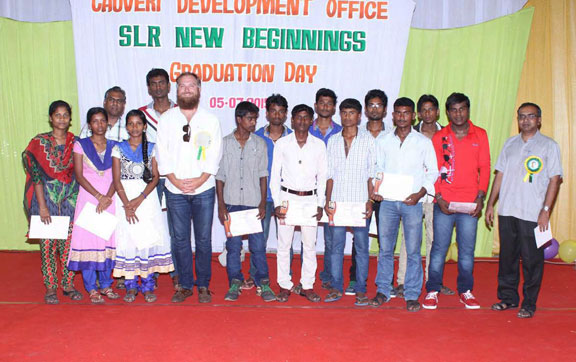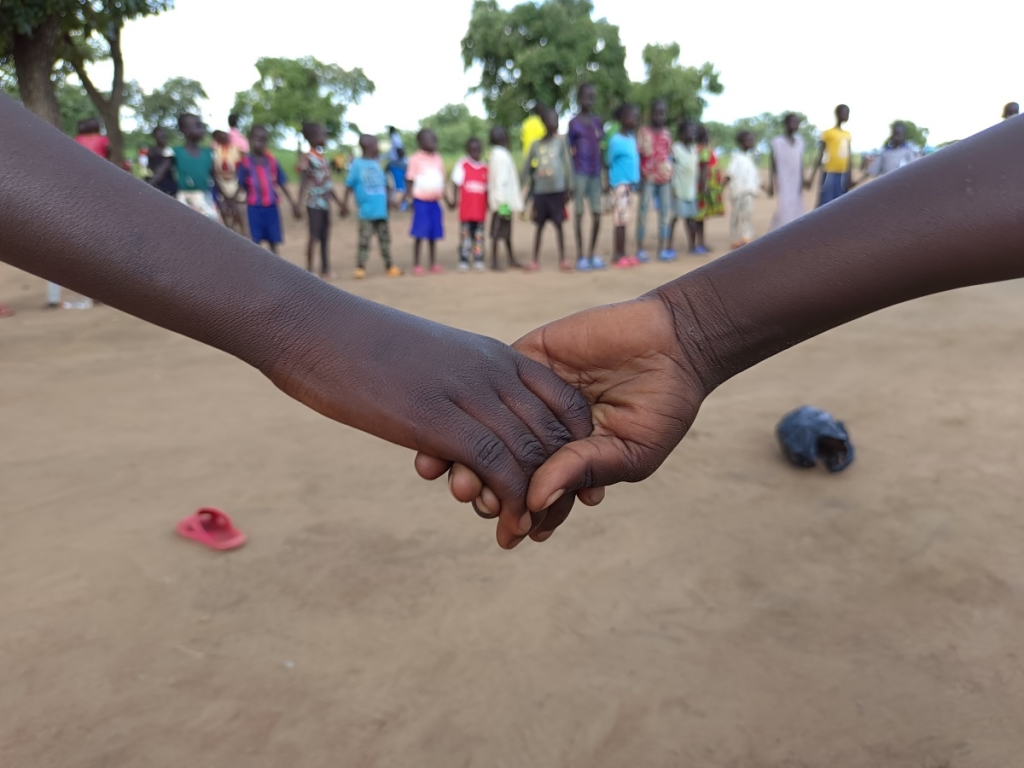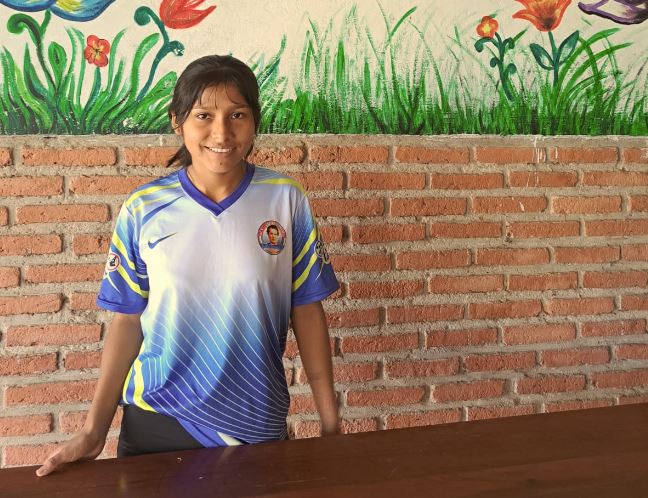WORLD REFUGEE DAY: Salesian Missions highlights programs that provide technical skills training and social programs for refugees

(MissionNewswire) Salesian Missions stands with the United Nations Refugee Agency (UNHCR) and other international organizations in honoring World Refugee Day, held each year since 2001 on June 20. The day, coordinated by UNHCR, honors the plight of millions of refugees and internally displaced people who have been forced to flee their homes.
UNHCR has noted that a record 68.5 million people have been forcibly displaced worldwide at the end of 2017. Among them are nearly 25.4 million refugees, over half of whom are under the age of 18. Fifty-five percent of all refugees come from the South Sudan, Syria and Afghanistan. More than 40 million people are displaced wihtin their own country. Some 28,300 people a day flee their homes because of conflict and persecution.
UNHCR has continued its 2016 #WithRefugees theme. The organization encourages everyone to add their name to the #WithRefugees petition to send a clear message to governments that they must act with solidarity and shared responsibility. To date, more than 1.9 million people have signed the petition that asks governments to: ensure every refugee child gets an education; ensure every refugee family has somewhere safe to live; and ensure every refugee can work or learn new skills to make a positive contribution to their community.
“On World Refugee Day, we must all think about what more we can we do to help. The answer begins with unity and solidarity. I am deeply concerned to see more and more situations where refugees are not receiving the protection they need and to which they are entitled. We need to re-establish the integrity of the international refugee protection regime. In today’s world, no community or country providing safe refuge to people fleeing war or persecution should be alone and unsupported. We stand together, or we fail,” said UN Secretary-General António Guterres in a statement about the day.
In countries around the globe, Salesian missionaries are assisting close to 400,000 refugees and internally displaced persons whose lives have been affected by war, persecution, famine and natural disasters such as floods, droughts and earthquakes. Salesian programs provide refugees much needed education and technical skills training, workforce development, health care and nutrition.
To mark World Refugee Day 2018, Salesian Missions is proud to highlight programs around the globe that provide life-changing education and support for refugees and internally displaced people in need. Salesian Missions, headquartered in New Rochelle, N.Y., is the U.S. development arm of the international Salesians of Don Bosco.
REFUGEES IN EGYPT
Through the Salesian Missions Sunrise Project for refugees and vulnerable Egyptians, 400 people are receiving support and 80 past graduates were recently invited to participate in in-depth seed fund grant training. These graduates submitted entrepreneurial projects to the Sunrise team who chose to fund approximately 40 projects.
In 2014, Salesian Missions, thanks to support of external donors, began working with the Instituto Don Bosco in Cairo to fund scholarships as part of the Sunrise Project. This skills training program assists refugees and vulnerable Egyptians in gaining the technical and life skills they need to find employment and support their families.
This project also provides life skills training, health awareness, entrepreneurship literacy workshops, job panels, seed grants, and violence prevention training to help refugees build the skills needed to succeed in the workplace and adjust in their new urban environments. One of the great successes of the project is the additional social services, including transportation vouchers for travel to and from the courses, funded for participants. Those engaged in the training are also provided vouchers to purchase groceries and other items from a local store. This helps to ensure that basic needs like nutrition are met for these individuals, as they work hard to meet the needs for themselves.
Each participant also receives a voucher for a primary care checkup and eye exam with a doctor who comes to the school. Some medicine prescriptions are included, and they receive referrals for secondary care as needed.
Including this project year, the Sunrise Project in Cairo has improved the livelihoods and quality of life of more than 1,300 Sub-Saharan African and Syrian refugees and vulnerable Egyptians. Of this total, 46.9 percent were female. Some 62.8 percent were African, 8.3 percent were Syrian, and 28.9 percent were vulnerable Egyptians.
REFUGEES IN KENYA
Kakuma was established in 1992 near Kenya’s border with South Sudan and was a place of refuge for unaccompanied minors fleeing warring factions in what was then southern Sudan. Today, the Kakuma refugee camp has more than 180,000 refugees, well over the 120,000-person capacity for which it was built. More than 44 percent of the refugees at the camp are from South Sudan and arrived after fleeing the country to escape conflict and violence.
Kakuma is operated by UNHCR in collaboration with Salesian missionaries in the country, as well as several other humanitarian organizations. The camp offers refugees safety, security and life-saving services such as housing, health care, clean water and sanitation. Salesian missionaries at Kakuma refugee camp operate the Holy Cross Parish and the Don Bosco Vocational Training Center where 1,044 young men and women are receiving critical employment and life skills. There are many courses available and those studying welding, carpentry and bricklaying often utilize their new skills helping to build infrastructure within the camp. Salesian missionaries are in the process of building a new school on a donated plot of land at the refugee camp in order to meet the growing demand.
SRI LANKAN REFUGEES IN INDIA
Salesian Missions received funding from the U.S. Department of State Bureau of Population, Refugees and Migration to conduct its New Beginnings program for Sri Lankan refugees in Tamil Nadu, India. The program, which is no longer active, provided more than 3,300 refugees vocational training scholarships. Since 1983, ethnic violence in Sri Lanka has forced tens of thousands of Sri Lankan Tamils from their homeland in search of safety and a new life in Tamil Nadu.
Refugees face many challenges as they begin to make a new life in their host countries. Sri Lankan Tamils are unique in that their host population in Tamil Nadu is also ethnically Tamil. While Sri Lankan refugees share a common language and customs with their host community, they still struggle to gain marketable skills and find livable wage employment.
Launched in 2010, Salesian Missions provided its New Beginnings program for young male and female Sri Lankan refugees who had been living in refugee camps in 15 target districts in India. In 2015, 550 women benefited from refugee camp-based small business incubator programs. The New Beginnings program provided market-conscious vocational and technical skills training that resulted in livable wage employment, allowing trainees to better support themselves and their families. Many refugees entered the program with few, if any, job prospects or with a history of low paid part-time work experience which is typically unskilled and often dangerous and exploitative.
REFUGEES IN UGANDA
Salesian missionaries recently launched a new Salesian center for South Sudanese refugees in at the Don Bosco Palabek Refugees Resettlement Camp in northern Uganda. The refugee camp is currently hosting 42,000 people with an average of 300 new refugees arriving each week from South Sudan. The camp was officially set up in April 2016 to reduce congestion in larger refugee camps in the northwestern corner of Uganda. Uganda hosts close to 1.3 million refugees.
Salesian missionaries working within the refugee camp report that 86 percent of the refugees there are women and children. The elderly comprises two percent. There are very few men, but a significant number of teenage boys are among the population. After reporting to the security, each household of five people is given a shelter and a few household items. Shelters are made of tarpaulin roofs and walls are held together with sticks and nails. Each household is given 30×30 meters of land, as well as 100 liters of water a day to manage all the home needs.
The archbishop of Gulu recently appointed Salesian Father Lazar Arasu as the chaplain of the refugees in the archdiocese. Salesian missionaries founded five chapels in the camp including St. John Bosco, Mary Help of Christians, Holy Cross, Daniel Comboni and Mother Theresa. The chapels are used for Catholic mass as well as a meeting place for young women and their children. There are games for youth, community meetings on peace issues and agriculture activities. Salesian missionaries are in the process of setting up nursery and primary schools. The goal is additional vocational training will follow.
###
Sources:
INDIA: Salesian New Beginnings Program Graduates 840 Sri Lankan Refugees
UGANDA: Salesian missionaries building new structures and programs in Palabek Refugee Camp
UNHCR – Refugee Statistics




